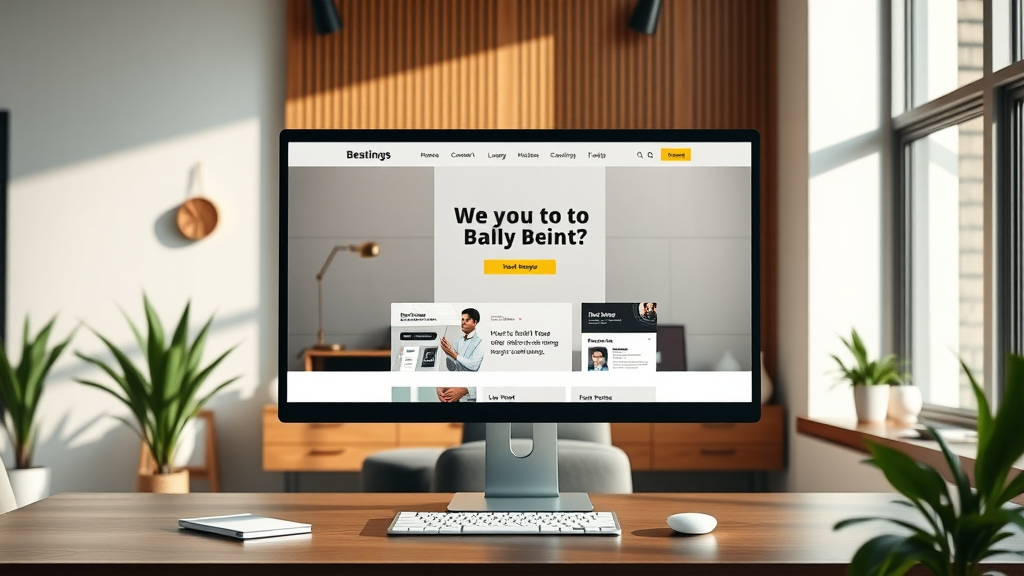Imagine doubling your business revenue in just three years—70% of small businesses with a professional business website achieve exactly that. In today's fiercely competitive digital world, small business website development is not just a marketing necessity but a proven growth catalyst. If you're seeking to boost your sales, attract more customers, and build real credibility online, this guide will show you how to turn your business website into your most valuable asset. Keep reading to uncover what sets apart high-performing small business websites and how you can launch yours—faster and smarter than your competitors.
Unveiling the Real Impact of Small Business Website Development

-
Did you know that 70% of small businesses with a professional business website double their revenue within three years? Explore how strategic small business website development can redefine your company's growth trajectory.
-
What You'll Discover in This Guide to Small Business Website Development
-
Practical steps to create a web presence that converts
-
Selecting the ideal website builder or site builder
-
Essential site design features for small businesses
-
Navigating costs and investment in professional web design
-
Maximizing ROI for your business web strategy
Developing a small business website is about far more than aesthetics. It's an engine for growth—a platform that can transform curious visitors into loyal customers. By embracing data-backed web design, leveraging top-notch site builders, and understanding the vital features your customers demand, you empower your company to seize real digital opportunities. Success begins with strategic planning and knowing which investments lead to measurable outcomes.
In the following sections, you'll gain a clear roadmap covering essential steps, cost breakdowns, and battle-tested methods to ensure your business website stands out online. Whether you want to manage your own site using a popular website builder or work with professional web designers , you'll find guidance, practical tips, and real-world examples you can trust.
Why Small Business Website Development Matters Now
The last few years have seen a seismic shift in consumer behavior, making small business website development more essential than ever. Customers expect seamless online experiences—they judge your credibility, reliability, and professionalism from your web presence. A well-crafted business website is now the foundation for sales, branding, and connection in any industry.
Businesses without a modern, optimized website often miss out on local searches, high-intent leads, and crucial online exposure. With affordable site builder platforms and cutting-edge web design trends, today's small businesses can compete on a level playing field—not just with compelling products or services but with digital excellence, too.
The Digital Landscape: Modern Site Builder and Website Design for Small Businesses
-
Essential web design trends
-
Why a customized business website accelerates small business growth
-
The role of responsive and mobile-friendly website design
"A well-designed small business website is no longer optional — it’s vital for credibility and trust in 2024."

Modern site builders and template-driven platforms have revolutionized small business website development by making it accessible and budget-friendly. However, true differentiation comes from customized business websites —tailored to embody your brand and optimized for mobile, making your products or services available to customers wherever they are. Embracing contemporary design features, intuitive navigation, and mobile responsiveness delivers exceptional user experience , which is pivotal for retention and conversions.
Responsive design isn't just a nice-to-have; it's necessary. With over half of all online traffic now originating from mobile devices, Google and other search engines reward mobile-friendly site design with higher rankings and better exposure. Businesses that harness these web design and development best practices build lasting trust, drive more qualified leads, and sustain digital growth even in competitive markets.
Core Elements of Winning Small Business Website Development
A successful small business website masterfully balances clear messaging, appealing design, and technical excellence. The process begins with setting strategic goals for your online presence, understanding your ideal customers, and selecting the right site builder or platform. Here's how you can create a high-converting website from the ground up:
Step-By-Step: How to Create a Business Website That Converts
-
Defining your business website goals and target audience
-
Choosing the best site builder or website builder platform
-
Crafting an engaging website design with professional web designers
-
Integrating contact forms, business information, and user-friendly navigation
-
Optimizing for speed, SEO, and mobile usage

Begin with your objectives. Is your priority lead generation, ecommerce, service bookings, or credibility? Tailor every aspect of your business web to these aims. Next, select a site builder or website builder that aligns with your needs—look for solutions offering drag-and-drop editors, SEO tools, reliable hosting, and scalable options for future growth. Invest in professional web design where possible, or choose high-quality templates and branding assets for a more affordable route.
Critical steps include integrating accurate business information, calls-to-action, and user-friendly navigation. Make sure your site design is visually consistent and facilitates the journey from landing page to conversion. Top-performing small businesses routinely audit site speed, SEO readiness, and mobile optimization, ensuring their web presence remains fast, accessible, and attractive to both users and search engines.
Choosing the Right Website Builder for Small Businesses
-
Top website builder options for small business web success
-
Comparing ease of use, design services, and pricing
|
|
|
|
|
Comparison of Leading Website Builder and Site Builder Platforms for Small Businesses |
|
Platform |
Features |
Pricing |
Pros |
Cons |
|---|---|---|---|---|
|
Wix |
Drag-and-drop, app marketplace, SEO tools |
$16-$45/month |
User-friendly, customizable, fast setup |
Some advanced features limited to premium tiers |
|
Squarespace |
Beautiful templates, ecommerce, blogging |
$16-$54/month |
Excellent aesthetics, solid support |
Learning curve for full customization |
|
Shopify |
Ecommerce-first, scalable, payment integrations |
$39-$399/month |
Best for online store features, 24/7 support |
Not ideal for simple sites, higher cost |
|
WordPress.com |
Content-rich, plugins, fully custom |
$4-$45/month |
Most flexible, huge plugin ecosystem |
Requires maintenance, steeper learning curve |
Choosing the right website builder impacts your day-to-day management and long-term growth. Compare core features like responsive templates, built-in SEO and analytics, ecommerce, and customer support. Some platforms offer end-to-end design services with professional guidance, while others cater to the hands-on site builder approach with robust DIY tools.
Web Design Essentials for Effective Small Business Website Development
To maximize the return on your small business website development investment, follow web design best practices proven to drive engagement and sales. The site's architecture should balance your brand’s personality with conversion-oriented layouts, featuring intuitive menus, visually compelling calls to action, and interactive elements that build trust.
High-performing small business websites include must-have features—responsive design for mobile optimization, fast loading speeds, integrated SEO, easy navigation, and visible contact points. These essentials make your business web accessible, search engine-friendly, and ready to convert visitors into leads or customers.
Site Design Best Practices for Your Business Website
-
How to balance branding and conversion-focused layouts
-
Must-have features for high-performing small business sites
"For small businesses, a strategic web design is an investment that pays dividends in customer trust and conversions."

Effective site design means finding the sweet spot—a visual identity that's memorable and distinct, yet easy to navigate. Prioritize clean layouts, consistent use of colors and fonts, and feature your unique selling points front and center. Conversion-focused design places important information—such as contact details, reviews, and offers—above the fold, making actions effortless for the visitor.
Essential features for high-performing small business sites include prominent CTAs, interactive contact forms, social proof (testimonials or reviews), and logical content hierarchy. Well-deployed site design creates a seamless experience across devices, helping your brand appear both approachable and authoritative.
Partnering with Professional Web Designers and Design Agencies
For many business owners, working with professional web designers or design agencies delivers unmatched quality, efficiency, and return on investment. These design companies bring a wealth of expertise in branding, UX/UI, and scalable digital strategy—enabling you to focus on your core operations.
Comparing in-house DIY builds to outsourced projects, consider your available time, budget, and the degree of customization you require. Professional agencies offer strategic project scoping, ongoing maintenance, and advanced integrations (such as booking tools or CRM systems), making them ideal for ambitious growth goals.
In-House vs. Outsourced Website Build: Which Suits Small Businesses Best?
-
Key benefits of using experienced design companies or design agencies
-
How to evaluate professional web design services
The decision to design in-house or outsource to a design agency depends on your resources and growth ambitions. Partnering with seasoned experts ensures a future-proof website build , from visual storytelling to conversion optimization. Evaluate agencies based on portfolios, client feedback, and alignment with your brand’s mission.
Design companies provide valuable perspective and a wide toolset—from custom photography to advanced SEO tools and digital marketing campaigns. Their holistic approach takes into account current best practices, accessibility standards, and industry-specific nuances.
Maximizing Value from Web Design Services
-
Negotiating scope and deliverables for your small business website
-
Understanding typical costs and packages for business web projects
|
|
|
|
Sample Pricing Breakdown for Professional Web Design Services |
|
Site Type |
Complexity |
Included Features |
Approximate Cost |
|---|---|---|---|
|
Starter (Landing Page) |
Low |
Single page, contact form, basic SEO |
$1,000 - $2,500 |
|
Standard Business |
Medium |
5-10 pages, forms, blog, SEO, mobile |
$2,500 - $7,500 |
|
Ecommerce/Advanced |
High |
Storefront, cart, advanced plugins, analytics |
$7,500 - $15,000+ |

To maximize value, clearly define the website's objectives, features, and must-have integrations. Negotiate scope, delivery timelines, and post-launch support up front. Understand that even premium-priced business web builds can pay off quickly through increased sales, improved customer retention, and enhanced online presence.
DIY Small Business Website Development: Step-By-Step Guide
Many small businesses successfully launch their own business websites using top site builder platforms. This approach is perfect for tight budgets or business owners who want hands-on control. Modern builders feature intuitive drag-and-drop editors, pre-optimized templates, and integrations with marketing tools—meaning anyone can now create a website with confidence.
Follow these DIY steps to build your online foundation and position your brand for growth:
How to Create a Website for Your Small Business Using a Site Builder
-
Assessing your needs: business website goals and essential features
-
Selecting templates and customizing your site design
-
Adding ecommerce or booking features for service-led small businesses
Start with clear goals. Do you need to sell online, book appointments, or educate your audience? Choose a site builder platform with features that fit these needs. Next, select a template that fits your brand vibe and customize content—logo, messaging, photos, and calls-to-action—for authenticity. For businesses centered on selling products or services, enable ecommerce or booking modules to streamline conversion and scheduling.
Top website builder providers like Wix, Squarespace, and Shopify offer libraries of site templates , robust apps, and even free web plans for basic needs. Test the user experience on desktop and mobile—if it's intuitive and visually appealing, you're on the right track toward launching a winning site.
Tips for Building an Effective Small Business Website Builder Experience
-
Maximizing user experience with drag-and-drop builders
-
Integrating third-party tools: marketing, analytics, and email
Leverage intuitive drag-and-drop editors for rapid, error-free builds. Preview changes across devices, streamline menus, and reduce clutter for an improved user experience . Most platforms offer app marketplaces—take advantage of email marketing, chatbots, analytics, and social media integrations to broaden your online presence and automate routine marketing.
As you fine-tune your site design , stay consistent—brand colors, font choices, and imagery matter for credibility. Test features like forms, bookings, and checkout for ease of use. Many builders include onboarding wizards and seo tools to help small businesses optimize for search engines right out of the gate.
Cost Breakdown: Investment Required for Small Business Website Development
Budget is a core consideration for any small business website development project. Costs vary widely based on size, platform, and complexity. Deciding between a free web builder plan, DIY upgrade, or investing in a professional web design service directly impacts up-front costs and long-term support.
The main drivers of website build costs are platform fees, template design options, number of pages, ecommerce requirements, and ongoing maintenance (support, updates, advanced features). Prioritize business goals and customer needs to find the right balance of spending and expected ROI.
What Influences the Total Website Build Cost?
-
Platform fees, website design complexity, and ongoing support
-
Budgeting for professional web design services vs. DIY
|
|
|
|
Approximate Costs for Website Builder Plans, Site Builder Tools, and Custom Web Design Agencies |
|
Solution |
Setup Cost |
Ongoing Fees |
Best For |
|---|---|---|---|
|
Basic Website Builder (Wix, Weebly) |
$0 - $300 |
$16 - $25/mo |
Simple business sites/startups |
|
Standard DIY Builder (Squarespace, WordPress.com) |
$200 - $800 |
$16 - $54/mo |
Growing businesses, advanced site design |
|
Professional Web Design Agency |
$2,500 - $10,000+ |
$50 - $300/mo for support/hosting |
Custom features, growth-focused businesses |
"Invest thoughtfully in your small business website development—it’s your most powerful digital asset."
Remember: quality small business website development pays off quickly. Even if you start small, prioritize features with the highest impact—responsive design, fast load times, and a trustworthy brand presence—then add complexity as your business grows.
Essential Features for High-Performing Small Business Websites
-
Responsive site design for optimal mobile functionality
-
Intuitive navigation and modern web design aesthetics
-
Fast loading times, SEO, and security essentials
-
Social proof: testimonials, reviews, and trust factors

The must-haves for a thriving business web presence include a mobile-friendly interface, clean navigational menus, quick loading speeds, and robust security (SSL certificates). Include authentic testimonials, clear contact information, and trust badges to reassure site visitors. Keeping your site design current with industry trends and optimizing on-page SEO dramatically enhances exposure in local searches and competitive markets.
Proactively gather client reviews, display certifications, and highlight your business's story. These simple steps foster trust and drive more conversions for local and online sales. Partnering with skilled web designers or using advanced website builder features can simplify adding these elements, keeping your small business website both beautiful and functional.
Online Presence: Marketing Your Small Business Website After Launch
Launching your business website is just the beginning. To maximize results, implement ongoing marketing and SEO strategies. Focus on local SEO, Google My Business, and digital channels like email marketing and social media. An active online presence increases brand visibility, brings in higher-quality traffic, and accelerates business growth.
Use analytics and user feedback to optimize flows, test calls-to-action, and measure results—ensuring a cycle of continuous improvement. Stay agile by integrating new digital marketing tools and tactics tailored to your target audience and growth objectives.
Leveraging Design Services and SEO for Better Online Visibility
-
On-page optimization for business web growth
-
Digital marketing strategies for small businesses
-
Integrating Google My Business and local listings

Tap into expert design services or use integrated seo tools to fine-tune your site post-launch. On-page SEO—fast load speed, mobile optimization, targeted keywords, and well-structured content—boosts rankings and attracts the right prospects. Register your business with Google My Business and industry directories to enhance local visibility.
Successful websites maintain a rhythm of content updates, blog posts, promotions, and customer engagement through email and social media . Consider digital marketing campaigns or PPC ads to amplify reach, particularly during key sales seasons or product launches.
Continuous Improvement with User Feedback and Analytics
-
Tracking website builder performance with analytics
-
A/B testing changes to boost conversions
Growth-driven small business website development means monitoring performance, acting on user feedback, and experimenting with site changes. Use Google Analytics, heatmaps, and session recordings to identify improvement areas. Simple tweaks—like adjusting CTAs, messaging, or navigation—can yield big gains in engagement and conversions when tested methodically.
Pair this data-centric mindset with ongoing updates and feature enhancements, such as adding new payment options, improving booking workflows, or launching targeted landing pages. Your website should always evolve alongside your business goals.
People Also Ask: Small Business Website Development Q&A
How much does it cost to have a website built for a small business?
-
The investment in professional web design for small businesses ranges from $1,000 to $10,000+. Influencing factors include the site builder platform, design agencies' expertise, custom features required, and whether you use a DIY website builder or hire a professional web designer.
How do I build a website for my small business?
-
For most small businesses, using a reputable site builder or website builder is the quickest route: select a plan, customize a template, add essential pages, and optimize for SEO. For advanced functionality, business owners may consult with design companies or agencies specializing in small business web projects.
Is it worth making a website for a small business?
-
Absolutely. A modern business website establishes credibility, increases local and online visibility, and can directly drive new customer acquisition and sales for small businesses.

How much does it cost to pay someone to design a website?
-
Hiring a professional to design a business website costs between $2,000 and $10,000+, depending on complexity, design agencies' experience, and unique requirements. Less complex sites or those built with site builder tools can cost less.
Expert FAQs on Small Business Website Development
-
Which website builder is best for small businesses in 2024? Popular choices include Wix, Squarespace, Shopify (for ecommerce), and WordPress.com. The best option depends on your design skills, feature needs, and budget.
-
What essential content does every small business website need? Must-haves: business overview, products/services, strong images, testimonials, contact forms, location, and FAQs.
-
How long does it take to complete a professional website build? Basic sites can launch in 2–4 weeks; complex, custom projects may take 2–3 months depending on revision cycles and feature requests.
-
What mistakes should small businesses avoid with website design? Skipping mobile optimization, unclear navigation, slow loading speeds, outdated branding, and missing CTAs are all common pitfalls.
-
Can I migrate my existing site to a new site builder? Yes, most platforms offer migration services or guides to help transfer your content, though some manual adjustments may be required.
See our hands-on comparison: Wix, Squarespace, Shopify, and more, highlighting ease of use, templates, SEO tools, and best picks for small businesses.
Real Results: Small Business Website Development Success Stories

-
Mini-case studies of successful business website launches
-
Impact metrics: increased leads, sales, and brand awareness
Case One: A downtown retailer launched a new mobile-friendly site with local SEO and social proof, resulting in a 120% surge in online inquiries within three months. Case Two: A service business upgraded their web design and added real-time booking, leading to a 75% increase in monthly appointments and a boost in five-star reviews. Case Three: A local cafe revived their brand with a modern site design and integrated email marketing, tripling their newsletter signups and improving customer retention.
These stories prove what’s possible with the right small business website development—measurable growth, stronger branding, and long-term digital success.
Ready to Accelerate Your Growth with Proven Small Business Website Development?
Take action now: Invest in your business’s future—start your website build or schedule a free strategy session and watch your small business grow!
To further enhance your understanding of small business website development, consider exploring the following resources:
-
“10 Things You Need to Know to Build a Small Business Website” : This article provides strategic insights into creating an effective online presence, covering essential elements like defining business goals, selecting the right platform, and implementing SEO best practices. ( techradar.com )
-
“10 Strategies for Effective Small Business Website Development” : This resource outlines practical steps to enhance your website’s performance, including mobile responsiveness, user-friendly navigation, and content optimization. ( webmarkhq.com )
By delving into these articles, you’ll gain valuable insights and actionable strategies to develop a high-performing website that drives growth and success for your small business.
 Add Row
Add Row  Add
Add 




Write A Comment